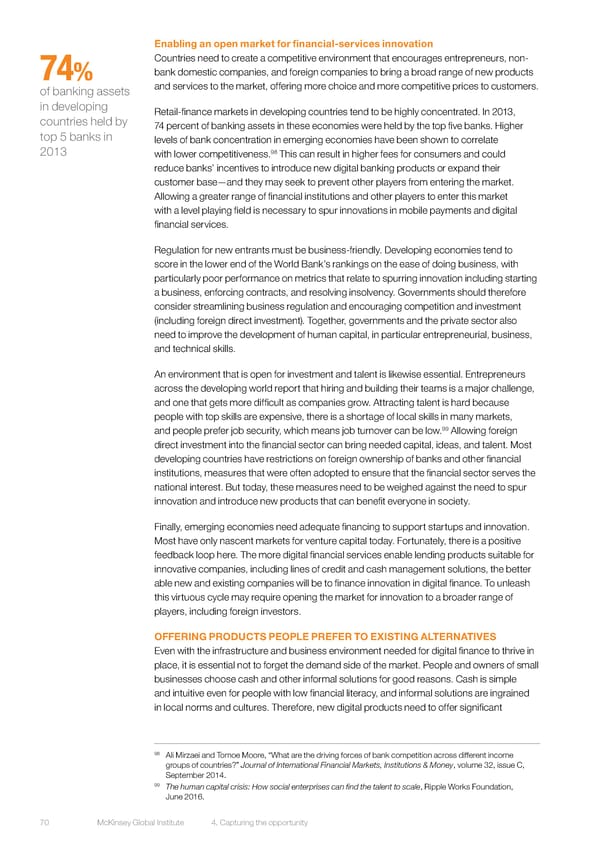Enabling an open market for financial-services innovation Countries need to create a competitive environment that encourages entrepreneurs, non- 74% bank domestic companies, and foreign companies to bring a broad range of new products of banking assets and services to the market, offering more choice and more competitive prices to customers. in developing Retail-finance markets in developing countries tend to be highly concentrated. In 2013, countries held by 74 percent of banking assets in these economies were held by the top five banks. Higher top 5 banks in levels of bank concentration in emerging economies have been shown to correlate 2013 98 with lower competitiveness. This can result in higher fees for consumers and could reduce banks’ incentives to introduce new digital banking products or expand their customer base—and they may seek to prevent other players from entering the market. Allowing a greater range of financial institutions and other players to enter this market with a level playing field is necessary to spur innovations in mobile payments and digital financial services. Regulation for new entrants must be business-friendly. Developing economies tend to score in the lower end of the World Bank’s rankings on the ease of doing business, with particularly poor performance on metrics that relate to spurring innovation including starting a business, enforcing contracts, and resolving insolvency. Governments should therefore consider streamlining business regulation and encouraging competition and investment (including foreign direct investment). Together, governments and the private sector also need to improve the development of human capital, in particular entrepreneurial, business, and technical skills. An environment that is open for investment and talent is likewise essential. Entrepreneurs across the developing world report that hiring and building their teams is a major challenge, and one that gets more difficult as companies grow. Attracting talent is hard because people with top skills are expensive, there is a shortage of local skills in many markets, 99 and people prefer job security, which means job turnover can be low. Allowing foreign direct investment into the financial sector can bring needed capital, ideas, and talent. Most developing countries have restrictions on foreign ownership of banks and other financial institutions, measures that were often adopted to ensure that the financial sector serves the national interest. But today, these measures need to be weighed against the need to spur innovation and introduce new products that can benefit everyone in society. Finally, emerging economies need adequate financing to support startups and innovation. Most have only nascent markets for venture capital today. Fortunately, there is a positive feedback loop here. The more digital financial services enable lending products suitable for innovative companies, including lines of credit and cash management solutions, the better able new and existing companies will be to finance innovation in digital finance. To unleash this virtuous cycle may require opening the market for innovation to a broader range of players, including foreign investors. OFFERING PRODUCTS PEOPLE PREFER TO EXISTING ALTERNATIVES Even with the infrastructure and business environment needed for digital finance to thrive in place, it is essential not to forget the demand side of the market. People and owners of small businesses choose cash and other informal solutions for good reasons. Cash is simple and intuitive even for people with low financial literacy, and informal solutions are ingrained in local norms and cultures. Therefore, new digital products need to offer significant 98 Ali Mirzaei and Tomoe Moore, “What are the driving forces of bank competition across different income groups of countries?” Journal of International Financial Markets, Institutions & Money, volume 32, issue C, September 2014. 99 The human capital crisis: How social enterprises can find the talent to scale, Ripple Works Foundation, June 2016. 70 McKinsey Global Institute 4. Capturing the opportunity
 DIGITAL FINANCE FOR ALL Page 84 Page 86
DIGITAL FINANCE FOR ALL Page 84 Page 86